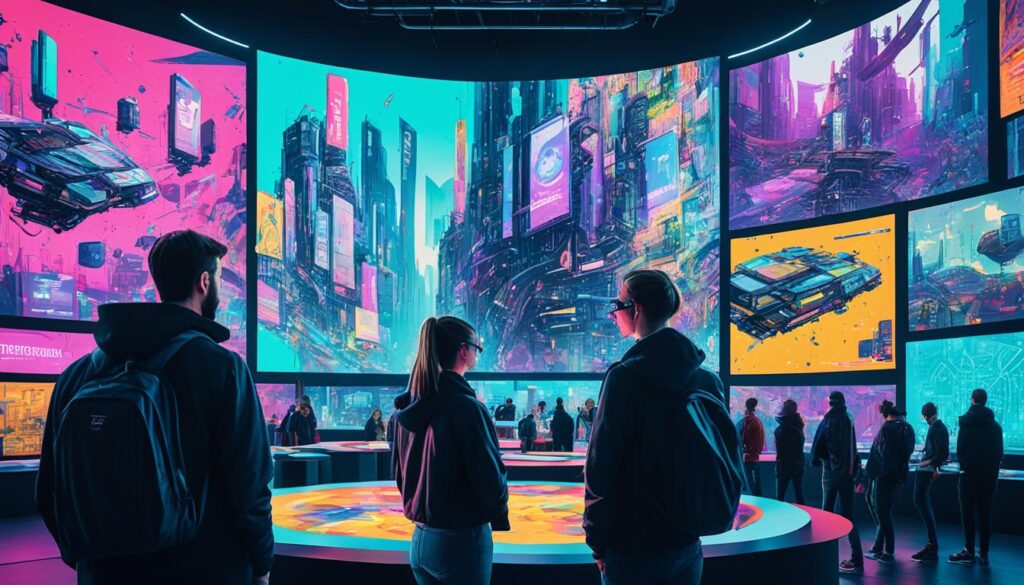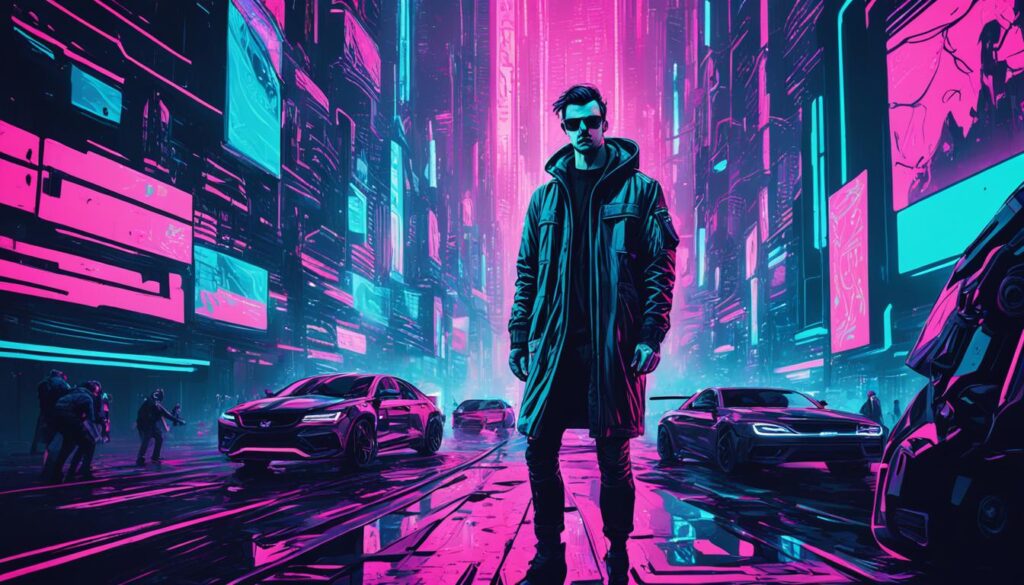As I dive into the digital world, I find AI content that shakes up what’s real. This trend is growing fast today. The arrival of AI changes more than just how fast we can do things. It also changes how we think about creativity and sharing ideas.
Take the event where an AI-made artwork won first at the Colorado State Fair. It made me think hard about what human expression means now. We are seeing a rush of digital art that is hard to tell apart from what humans can make.
The fear that AI might take over our thinking jobs doesn’t diminish the need for human creativity. Nor the value of having our own voice. As the world leans more into AI, college students should sharpen their human skills. That way, they stay important in a future filled with AI.
With AI making content that seems real, having a unique personal voice is crucial. Skills like how to present well and connect with people show the value of being human. AI can’t match this human warmth yet. I am driven by the mix of hope and worry experts feel about our tech-charged future. It pushes me to find a way that combines the best of technology and human spirit.
The Evolution of Immersive Environments
Virtual worlds are everywhere, as stats show. A huge 62% of articles say they’re used in many fields like healthcare, education, and engineering. This shows many are moving to use immersive environments to change old ways.
In healthcare, digital innovation changes things a lot. 18% of studies talk about how virtual reality helps in training doctors. This means using AI to create practice scenarios, greatly helping medical outcomes.
About 13% of articles look at virtual reality in education. Immersive environments make learning fun and more effective. It’s a new way to teach that uses digital tools for better learning.
Engineering is also getting into virtual reality, with 5% talking about its use in designing products. This could mean planning buildings in AI-generated landscapes before they’re even built.
Different fields also use virtual worlds. Things like self-driving cars and military training show how important they are for new inventions.
When looking at what experts think, it’s mixed. About 42% are both excited and worried about how tech affects us. Some 37% are mostly worried about problems like less privacy and misinformation. Yet, 18% are hopeful, thinking tech could help us in big ways.
Experts are really worried about things like people being targeted by data, growing inequality, losing privacy, and false information spreading. They fear that as tech grows, problems like loneliness, job loss, and online attacks could get worse.
Thinking about AI, there’s worry it could change society a lot, maybe causing more poverty as jobs go away. This makes discussing ethics in AI-generated landscapes very important.

Looking at Adobe Firefly and AI, there’s so much new creativity out there. With big ethical questions and amazing tech side by side, we must be careful. We should make sure the immersive environments we build make life better, not harder.
AI’s Influence on Artistic Creation
The use of AI in art has sparked innovation and deep conversations about creativity’s value. Generative AI suggests art could change. This might disrupt the art market, impacting artists worldwide.
However, many artists include Adobe Creative Cloud elements in their work. They are creating new art forms with AI, like AI avatars. These avatars can show complex emotions, offering new insights into human experiences.
There’s debate over AI and emotional depth. Can algorithms capture the emotion in art as humans do? It’s unclear, but connection to art matters most. AI can mimic emotions, but human art has a special depth.
Authorship and copyright issues in AI art add complexity. I see AI as a helpful tool in art. It opens new creativity avenues without replacing human artists. It makes art more touching and meaningful.

With tools like Adobe Creative Cloud, AI’s impact on art is still debated. Humans bring unique creativity to AI, possibly redefining art. As I explore this evolving field, I remain hopeful. I believe human connection will always be central to art’s value.
Information Credibility in the Age of AI
Exploring digital content has become trickier with generative AI tools on the rise. OpenAI’s ChatGPT reached over 100 million users quickly. This shows how much we depend on such technology. Yet, this brings big challenges in spotting misinformation and data manipulation.

Now, it’s hard to tell apart human from machine-made texts. Experiments show U.S. legislators respond similarly to both. This means platforms need to work harder to tell if content is AI-made. Models like Flan-PaLM can even pass medical tests, stressing the need for strong truth checks.
The gap between technology and truth is closing. AI can create stuff that looks like human work. This could harm our democracy, as propaganda uses this to spread their message. Chatbots can change what people believe, starting serious influence campaigns.
In politics, the impact of AI is undeniable. The investigation into AI-voiced robocalls in New Hampshire and deepfakes of Taiwanese politicians show AI’s dark side. Tech giants are now trying to find ways to check AI content. They see that keeping information credible is both a technical and moral challenge.
These issues are serious, but there is hope. At events like Davos, leaders see AI propaganda as a real danger. The key is balancing technology, truth, and ethics. This will help protect the future of honest information.
Shift of the Truth in an AI Generated World

In 2022, we saw amazing tech like DALL-E 2, Cicero, and self-driving cars. These innovations show us how AI is changing our world. It’s making us think about the shift of the truth in an AI generated world. We’re now dealing with smart chatbots, such as ChatGPT, which Gary Marcus warns could spread misinformation. This concern highlights the risks of deepfake technology.
Many are speaking up about keeping truth in the AI age. They’re focusing on the potential dangers, like AI tricking us with fake emails or deepfakes. I’m moved by these voices stressing the need for caution.
I find myself between admiration and concern for AI. It brings creativity to many fields but also causes problems, like leaking confidential info. In software, AI now helps write code comments, showing its growing impact.
I agree with those who call for careful AI interaction. They suggest being wary of AI, protecting personal info, and doubting suspicious messages. This is about keeping safe, not living in fear.
I hope we use AI responsibly and keep honesty a priority. As AI changes what’s real to us, we must hold onto what’s true. Let’s use AI to build trust, not break it down.
Conclusion
As I wrap up my exploration of artificial intelligence, I feel both cautious and hopeful. I’ve noticed how Large Language Models (LLMs) are shaking up the status quo. They are making information more accessible, but this also means we need to be sharp. We must discern fact from opinion in this new AI-driven world.
Thinking about Wikipedia, I admire its commitment to free knowledge over profit. Yet, the rise of AI content brings both risks and rewards. It could mislead or empower us. This is evident as freedom online drops and manipulation increases. Still, Wikipedia’s growth shows our desire for an open, accurate web.
So, I’m determined to navigate this complex, uncertain future with caution. I want to ensure AI helps us, not tricks us. My goal is a future where technology uplifts and enlightens us, always rooted in our humanity through every tech advancement.
Source Links
- https://www.nytimes.com/2023/02/02/opinion/ai-human-education.html
- https://www.pewresearch.org/internet/2023/06/21/as-ai-spreads-experts-predict-the-best-and-worst-changes-in-digital-life-by-2035/
- https://www.ncbi.nlm.nih.gov/pmc/articles/PMC9517547/
- https://brainpod.ai/empowering-creativity-or-painting-a-threat-the-intriguing-intersection-of-ai-and-artists/
- https://www.ipic.ai/blogs/why-question-ai-generated-arts-authenticity/
- https://www.foreignaffairs.com/united-states/coming-age-ai-powered-propaganda
- https://www.bostonglobe.com/2024/01/22/nation/ai-is-destabilizing-concept-truth-itself-2024-election/
- https://www.nytimes.com/2023/01/06/opinion/ezra-klein-podcast-gary-marcus.html
- https://www.pcmag.com/opinions/why-ai-is-the-nemesis-of-truth-itself
- https://www.psychologytoday.com/us/blog/the-digital-self/202401/is-truth-a-casualty-of-artificial-intelligence
- https://www.freedomhouse.org/report/freedom-net/2023/repressive-power-artificial-intelligence
- https://www.nytimes.com/2023/07/18/magazine/wikipedia-ai-chatgpt.html